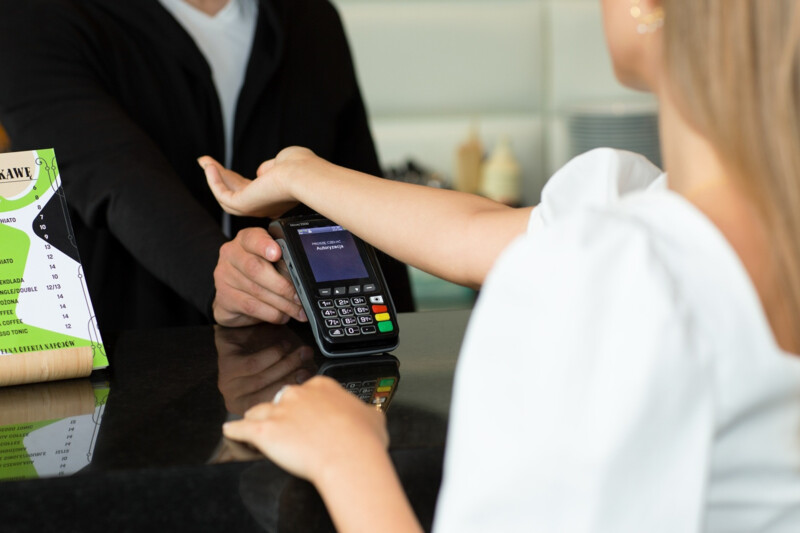Une nouvelle tendance se développe lentement mais sûrement depuis quelques années : le paiement sans contact au moyen d’une puce électronique implantée sous la peau. La BBC s’est penchée sur cette technologie et ses conséquences, notamment en termes de contrôle et de stockage des données.
Une puce sous-cutanée connectée à son compte bancaire
C’est en 1998 qu’une puce électronique a pour la première fois été implantée sous la peau d’un individu, mais il aura fallu attendre la dernière décennie pour que cette technologie soit commercialisée par des entreprises comme Walletmore.
Cette startup anglo-polonaise propose à ses clients, pour un montant de 200 euros, l’envoi d’une puce par la Poste, qu’il faut ensuite faire poser par un médecin acceptant cet acte peu courant. La durée de vie des puces électroniques vendues par Walletmore est de 5 ans, ce qui implique plusieurs petites interventions chirurgicales au cours d’une vie.
Une fois la puce en place, le client peut alors la relier à son compte bancaire et l’utiliser comme moyen de paiement sans contact dans le monde entier.
Interrogé par la BBC, Wojtek Paprota, fondateur et directeur général de Walletmore, déclare que « l’implant peut être utilisé partout où les paiements sans contact sont acceptés ».
Il assure également que la commercialisation de ces puces n’enfreint aucune loi en vigueur, et que 500 clients se sont d’ores et déjà laissé séduire par ce concept.
La puce fonctionne grâce à la technologie NFC (Near Field Communication), qui permet d’échanger des données entre un lecteur et un terminal mobile compatible, ou entre plusieurs terminaux. C’est sur cette même technologie que repose le paiement sans contact avec un smartphone.
L’épineuse question de la sécurité des données de la puce électronique sous la peau
Si la perspective de se faire implanter une puce électronique de paiement n’est, pour beaucoup, guère réjouissante, une enquête réalisée en 2021 au Royaume-Uni et dans différents pays de l’Union européenne révèle que sur 4 000 personnes interrogées, 51 % d’entre elles envisageaient de tenter l’expérience. Malgré tout, le caractère invasif d’une telle puce et les questions de sécurité demeuraient, selon l’enquête, des préoccupations majeures des personnes sondées.
Parmi les arguments avancés par les défenseurs de ces puces de paiement, figure celui selon lequel les animaux de compagnie sont eux-mêmes équipés de puces électroniques permettant de les identifier, sans risque pour leur santé et sans dérive. Fonctionnant avec la technologie RFID, elles ne sont pas utilisées pour géolocaliser les animaux, mais servent à communiquer des informations sur l’identité de l’animal lorsqu’elles sont scannées au moyen d’un lecteur compatible.
Toutefois, comme l’explique la BBC, le doute est légitime : rien ne permet d’affirmer que les puces électroniques, à l’avenir, ne serviront pas à stocker de nombreuses données confidentielles, susceptibles de tomber entre les mains de personnes peu scrupuleuses de l’éthique et du respect de la vie privée.
Selon Nada Kakabadse, professeure de politique, de gouvernance et d’éthique à la Reading University’s Henley Business School au Royaume-Uni, ces puces électroniques sous-cutanées pourraient mener à plus « de contrôle, de manipulation et d’oppression », explique-t-elle à la BBC, et conduire à « l’impuissance de beaucoup pour le bénéfice de quelques-uns ».
Autre son de cloche du côté de Steven Northam, maître de conférences en innovation et entrepreneuriat à l’Université de Winchester. D’après lui, il n’y a pas lieu de s’inquiéter, ces « petits objets inertes » étant sans risque. Il faut dire qu’en parallèle de son travail de chercheur, Steven Northam a lui-même fondé une entreprise de puces sous-cutanées sans contact, BioTeq. Sa société commercialise des puces destinées à un tout autre usage, puisqu’elles permettent aux personnes en situation de handicap d’ouvrir des portes à distance. Les applications sont donc nombreuses, au même titre que les dérives potentielles.
